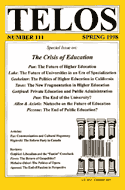Each Tuesday in the TELOSscope blog, we reach back into the archives and highlight an article whose critical insights continue to illuminate our thinking and challenge our assumptions. Today, Marcus Michelsen looks at Valerie Allen and Ares Axiotis’s article “Nietzsche on the Future of Education,” from Telos 111 (Spring 1998).
 If someone were to ask me the question “What is authoritative?” I might as well say, “I am. What I give my assent to has authority in my life.” Though true if one admits that for authority to manifest itself it must be recognized by someone, and for something to become authoritative in my life it requires just such a manifestation to me; still, this turns the question around. If I am pursued by the following question “How do I recognize what I should assent to?” the Enlightenment provides me with the answer: “Reason. Reason has authority in our lives. History itself testifies to the reason that formed it in the decisions of great men and in freedom, the spirit of the people. Moreover, to be enlightened means precisely to be in possession of reason.” There are, however, reasons to suppose that such an answer is suspicious, and that the Enlightenment, by glorifying itself, leads us astray. What if, in the belief that authority comes from reason, we have got it wrong?
If someone were to ask me the question “What is authoritative?” I might as well say, “I am. What I give my assent to has authority in my life.” Though true if one admits that for authority to manifest itself it must be recognized by someone, and for something to become authoritative in my life it requires just such a manifestation to me; still, this turns the question around. If I am pursued by the following question “How do I recognize what I should assent to?” the Enlightenment provides me with the answer: “Reason. Reason has authority in our lives. History itself testifies to the reason that formed it in the decisions of great men and in freedom, the spirit of the people. Moreover, to be enlightened means precisely to be in possession of reason.” There are, however, reasons to suppose that such an answer is suspicious, and that the Enlightenment, by glorifying itself, leads us astray. What if, in the belief that authority comes from reason, we have got it wrong?
In their article “Nietzsche on the Future of Education,” Valerie Allen and Ares Axiotis examine certain “threats” theorized by Nietzsche “internal to the principle of ‘reasonableness’ itself.” These threats specifically address the university because they concern “that principle upon which the liberal university is based.” The threats to reason issue from the reason-authority axis characteristic of three unities of the Enlightenment developed and problematized in the essay: the unity of knowledge, the unity of teaching and research, and the unity of the student/teacher relation. There are two basic problems: (1) allocating authority to reason hampers the emergence of certain legitimate sources of authority; and (2) mixing authority with reason actually derails reason from its essential purpose, which would take place outside the scope of authority and be characterized by “the spontaneity of the en-th[e]ou-siasmos (literally: ‘in-divination’).”
The authors develop a notion of what Nietzsche’s model educational situation would look like, developing their ideas from a lecture series by the early Nietzsche entitled “On the Future of our Educational Institutions.” On the one hand, they describe an initiation into a kind of special society: “The Greek concept of education as radically initiatory thus provides the key to understanding Nietzsche’s reference to the Burschenshaft, since the process of initiation necessarily implies the existence of some kind of thiasos (‘company,’ ‘confraternity’ or ‘troupe’) to which the initiate makes application and gains admission in order to share the experience of life-change.” On the other hand, the authors sketch a space without authority for the purpose of leaning to use reason: “The implication for education is, therefore, quite evident: if thought is to be the ultimate aim of education, then the structure of thinking must itself be embodied in the structure of educational institutions themselves.” They suggest what Nietzsche has in mind is a “Schole,” which “is not an institution—a ‘school’ in the modern sense—nor is it a condition or state as the English word implies (‘at leisure’). It is a mysterious and an-archic power, which shuts the eyes, the ears, and the mouths to the functional imperative of fitness-for-purpose and sets everyday life out of joint in order that one may see, hear, and speak with the spontaneity of the en-th[e]ou-siasmos.”
If the ideals of the university, the three unities mentioned above, constantly undermine themselves because they assign an impossible task to reason, debasing reason through the unending quest to merge reason with authority, the question remains: can we really imagine reason in the absence of authority? Furthermore, must we do so in order to protect the integrity of this intimate aspect of our lives? The authors appear to adopt this position by reanimating Nietzsche’s arguments, however one wonders whether the solution that they sketch out is in any practical sense possible.
Read the full version of Valerie Allen and Ares Axiotis’s “Nietzsche on the Future of Education” at the TELOS Online website. If you are affiliated with an institution that is an online subscriber to Telos, you have free access to our complete online archive. If not, you can purchase 24-hour access to this and other Telos articles at the low rate of $5/article.








